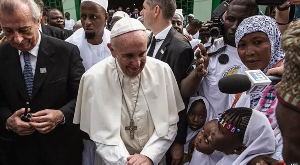Appiah Kusi Adomako, CUTS Ghana
Have you wondered why it is expensive for you to fly from Accra to Ouagadougou than to fly from Accra to London? Have you wondered why the Ghana Water Company Limited is not keen about improving is services? The answer is due to the absence of competition in the services that they deliver.
Competition is a basic mechanism of the market economy and encourages companies to provide consumers products that consumers want. In the US, it is called the Antitrust or antimonopoly in China. Countries that have developed their industries and service sectors have a strong competition regime to prevent market distortions thereby increasing efficiencies.
Competition encourages innovation, and pushes down prices. In order to be effective, competition needs suppliers who are independent of each other, each subject to the competitive pressure exerted by the others. Competition puts businesses under constant pressure to offer the best possible range of goods at the best possible prices, because if they don't, consumers have the choice to buy elsewhere. In a free market, business should be a competitive game with consumers as the beneficiaries. We have seen competition in the telecom sector. It is now cheaper today to own a mobile phone than it was fifteen years ago.
The objective of a functional competition regime is to promote competition, and contribute towards increased efficiency and curb anti-competitive practices in the market. Anti-competitive practices including cartels, abusive monopolies, predatory pricing, collusive tendering, exclusive market sharing agreements, bid rigging etc. have negative effects on both consumers and producers. Certainly, a well-enforced competition regime reduces uncertainty for businesses and is an important element of promoting private sector development.
In an absence of competition, agreements between companies that restrict competition – cartels or other unfair arrangements in which companies agree to avoid competing with each other and try to set their own rules, abuse of a dominant position – where a major player tries to squeeze competitors out of the market, and mergers and acquisitions that result in player dictating the market.
A trip into the memory lane in this country tells us how the price of cement was moving up even when raw materials and other variables were steady in the input market. GHACEM, for example has enjoyed dominance in the market. In 2007, the prices of cement in Ghana nearly doubled causing great concern in the building industry. Indeed, calculations commissioned by the Auditor-General, using data concerning price movements, production and raw material costs, suggested that cement could be retailed at less than 4.6 Ghana Cedis and a decent profit can still be made on top. In the absence of competition in the cement industry, prices were determined largely by GHACEM due to its share of the market.
Now with the removal of entry barriers in the cement market, new domestic players have come into the market offering an alternative to GHACEM dominance. Now the cement prices are relatively stable compared with historical trends. With this enhanced competition, cement manufacturers in the country have to be creative, retool the system to be able to compete and make descent profit. The era of allegedly causing artificial shortage in the industry is over and now consumers are looking to buy cement product which will meet their pockets and their needs.
The issue is that when a firm becomes bigger in the market, it turns to abuse its dominance not only to consumers but other competitors in the market. For market to be efficient and optimal, there must be competition policy and law to regulate the actions of firms and business. Though it is understandable that some form of competition exists naturally in some of the markets, however, competition cannot be achieved automatically and needs to be nurtured – by the introduction and propagation of a competition regime.
Competition regimes and consumer protection issues reinforce each other. They aim to ensure wider consumer choice in markets for goods and services, through innovation and efficient resource use by players in the market to promote economic welfare. Further, it endeavours to stimulate effective price competition between suppliers, and deter anti-competitive behaviour. This helps consumers get real value for their money. If passed and implemented effectively, empirical evidence and country experience suggests that an effective competition regime can promote private sector development, economic growth and poverty reduction in both developing and least developed countries.
The United Nation Conference on Trade and Development (UNCTAD) for many years has been urging developing countries to make competition and regulatory reforms a priority as a way of boosting trade and investment and thereby taking advantage of the globalized world. A series of studies have provided evidence of effects from the absence of a well-regulated business environment and effective competition laws. An eminent economist like Nobel Laureate Joseph Stiglitz (2001) asserts that, “Strong competition policy is not just a luxury to be enjoyed by rich countries, but a real necessity for those striving to create democratic market economies”.
A large number of countries in the world including developing countries from Africa (Zambia, Malawi, Zimbabwe, Botswana, South Africa, Kenya, and our neighbours like The Gambia, Burkina Faso, Mali, etc.) have put in place a competition law and an agency to implement the act. However, in spite of having made a few attempts in the past, Ghana has not been able to adopt a Competition Law. The protection against unfair competition act 2000 (Act 589) does not achieve the full dosage requirement for an effective competition region.
CUTS Ghana has demonstrated empirically from the COMPAD Project (with support from the BUSAC Fund) how a functional competition policy and law will engender the growth of businesses and make Ghanaian businesses to compete with foreign ones. The main goal of COMPAD Project is to complement the Government of Ghana’s efforts towards evolving a functional national competition policy and law in Ghana, through an informed process, incorporating the views of key actors and with public support.
In conclusion, the Ministry of Trade and Industry (MOTI) should work as matter of urgency in developing the competition policy for the country incorporating the views from various stakeholders. The time to do it is now.
Appiah Kusi Adomako is the Country Coordinator for CUTS Ghana. CUTS Ghana is a policy think tank which works in the areas of consumer protection and education, economic regulation, trade and development, regional integration, competition policy and law, etc. For more information about CUTS, and competition policy and law | Office: +233-30-224-5652 | Email: apa@cuts.org, Website: http://www.cuts-international.org/ARC/accra
Opinions of Sunday, 14 February 2016
Columnist: Adomako, Appiah Kusi














